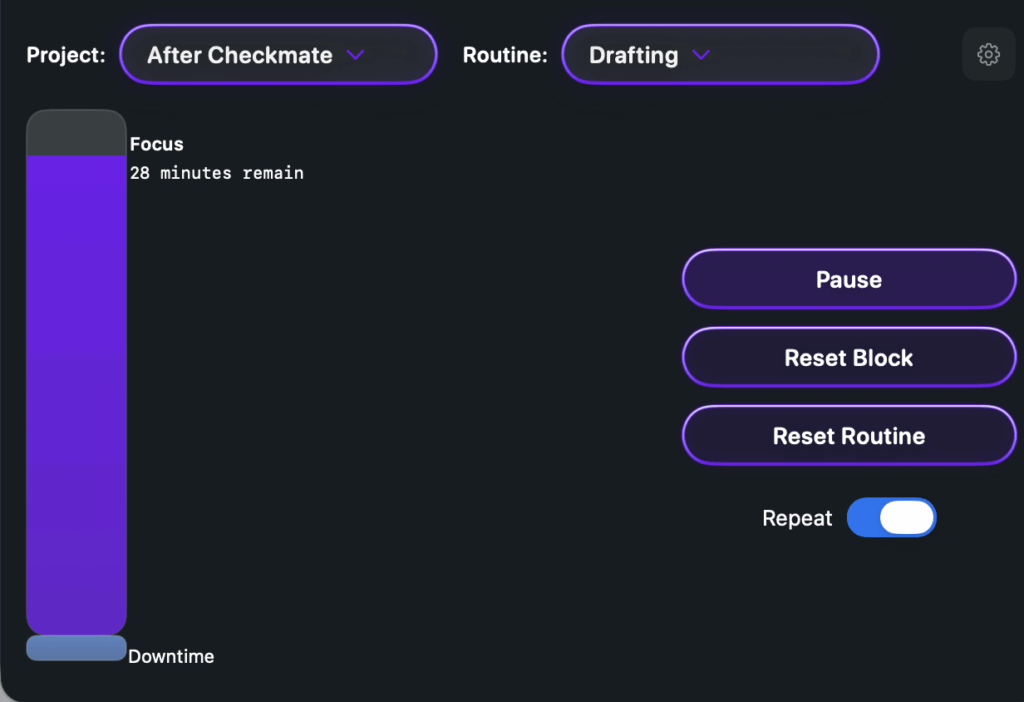Writers love their tools.
Not because they make us write (let’s be honest, nothing can make us write) but because the right tool at the right moment makes the work easier, clearer, or simply more enjoyable.
Over the years, I’ve built a small ecosystem that supports how I write, think, and organise. It’s not flashy. It’s not complicated. It’s a toolkit that’s become mine through trial, error, and a lot of drafts that taught me what doesn’t work.
Me, I favour tools that get out of the way—or, more accurately, tools that help me get out of my own way. I’m easily distracted. If the screen is busy, I’m gone. Simplicity keeps me honest.
Here’s what’s in my kit right now:
Pages
For drafting, editing, and final polish. Simple, clean, native to Apple, and powerful enough for 99% of what I need. A little bit of configuration, and it’s pretty minimalist too.
Obsidian
For notes, world-building, plot maps, and idea capture. Markdown-based, local-first, ridiculously flexible. It’s my second brain. Added bonus—even without paying for it, it syncs nicely via iCloud, and is on both my Macs, my iPad and my phone.
Apple Notes + Dictation
For when inspiration strikes out in the world. I can be walking to the café, brain throwing up story logic or a line of dialogue, and instead of losing it—I dictate it into Notes. Low friction. Zero excuses.
And now there’s something new.
Something I’m making (and a big part of the reason I’ve been so quiet around here lately).
I’m making it for writers. First of all, I’m making it for me.
Introducing Drapht
I’ve been working on a tool for my own writing process—a way to structure my time, track my flow, and keep momentum without obsessing over word count. Something that encourages showing up rather than beating myself up.
I built it for me. I hope other writers will find it helpful too.
It’s called Drapht.
At its core, Drapht is a timer and progress tracker designed specifically for writers. No gamified nonsense. No distraction. Just blocks of focused time, clear visual and (optional) audio feedback, and a way to see your writing rhythm develop over days, weeks, and projects.
It’s not ready for a big reveal yet. But it’s real, and it works, and I’m using it daily.
Why Add Tools?
Because tools are not solutions. They’re not there to do the work for you, they’re there to help you do the work better.
Every piece in this toolkit exists to reduce friction, not replace the work. Pages helps me write. Obsidian helps me think. Notes helps me catch the lightning before it’s gone. Drapht helps me keep moving in the right direction when I’d otherwise stall out or get distracted by something shiny.
Drapht doesn’t replace the work. It nudges me into doing it. It gives me some structural support, not a shortcut.
Did I mention that Drapht is Shiny?

Define a project and a routine in the config (it comes with some sensible defaults), and hit ‘Start’. The bar burns out, then you’re optionally prompted to enter your new word count. Then it will move on to the next block of time. A stack of blocks forms a routine, and a routine can be automatically repeated.
I find that if I try to focus for too long at a stretch, my brain wanders off and drags me with it. So, my standard routines are about 20-30 minutes of focus, then 5-10 minutes of something else. I have voice-overs configured to remind me of what I want to do, things like “Go walk around a bit, you’re back in ten” or “Refill your water!”, then “Right, back to work! This book ain’t gonna write itself!”.
Really, this is all to say that it isn’t vapor-ware, it IS real, and I’m using it. It still needs some polish and refinement, and I want to get some dopamine inducing analytics (my brain does love that dopamine!) in place before I go live, but as it is right now? It’s usable, and it’s helping me to focus while I work on making it better.
The Takeaway
Your toolkit doesn’t need to look like mine. But it does need to serve you. Don’t ask “What should I be using?” Ask “What makes my writing easier?”
That’s the real point of tools: not to feel fancy or productive—but to make writing less of a battle with ourselves.
Drapht is my latest addition to that fight. I’ll talk more about it soon.
For now? Back to the words.
PS. Obligatory marketing speak:
“Coming soon to the Mac App Store!”
…or something like that. Because it is.